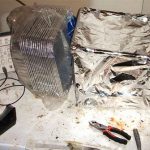
How to survive in a post-EMP world: Items you need to include in your garbage can Faraday cage
Friday, August 23, 2019 by Rex Carter
http://www.emp.news/2019-08-23-how-to-survive-in-a-post-emp-world-items-you-need-faraday-cage.html

EMP attacks aren’t sci-fi; these pulses disrupt electronic components and overload power transmission or telecommunications facilities. The likely result is a collapse of civilization, as it’s hard to think of any part of society that’s not connected to or powered by electricity. A Faraday cage can protect important devices, such as mobile phones, radios, and computers, from the harmful effects of an EMP attack. (h/t to ModernSurvivalBlog.com)
An electromagnetic pulse or EMP may be harmless to humans, but its effects on society may well be crippling. It carries energy that’s similar in magnitude to conventional radio waves, but EMP is sent in a “burst” – imagine receiving sunlight packed in less than a second. Some EMPs also fire in several pulses, which can deal additional damage. As a result, a sufficiently strong EMP attack can shut down power grids and telecommunication equipment, even the internet, whose data farms require lots of power. It can also incapacitate refrigeration, water services, security systems, banking systems, and transportation.
Recovery from an EMP attack is possible, but it may depend on the area and how widespread it is. An EMP attack that affects an entire country, however, may take years, even decades to recover. Such an incident leads to a collapse of law and order, which preppers should plan for when building a BOB (bug-out bag) or a Faraday cage.
Faraday cage starter kit
For starters, you want to shield any equipment that will let you communicate with other people or help you survive in a world that’s suddenly without power. These things include:
- Sources of light (headlamps, flashlights, lanterns, especially LEDs as they often contain electronic components)
- Digital watch
- Radios, especially shortwave radios or walkie-talkies
- Mobile phones or tablets
- Laptops, external hard drives, or USB keys with important information
- GPS devices
- Ignition system, CPU, and alternator for your car
- Ignition system for other equipment like mopeds or tractors
- Ignition systems for certain tools like chainsaws, snowblowers, or mowers
- Battery starter
- Electronic measuring devices
- Night vision equipment
- Battery-operated optic sights
- Solar panels with micro-inverters
- Compact solar-powered chargers for car batteries and rechargeable batteries (AA, AAA, C, and D)
- Powerbanks for USB-powered devices
Building a Faraday cage
A Faraday cage, in essence, is an enclosure lined with sheets of aluminum foil or a box with aluminum wire mesh. Aluminum is shown to block electromagnetic fields. You can use custom-made boxes or make your own using an ammunition can, steel barrels, or even a garbage can. Faraday cages don’t need to be grounded.
Your microwave oven can also act as a Faraday cage in a pinch. This device not only keeps radiation in, but also keeps it out. Anti-static bags are also an additional layer of protection that you can use in which to store your electronics.
Effectiveness of Faraday cages
How effective your Faraday cage is depends on the intensity of the EMP, its distance from the source, and the radiation emitted by the EMP. Naturally, the closer you are from the source, the more protection the contents of the Faraday cage requires. Some rays, however, like gamma and X-rays, can penetrate through layers of solid material and will require additional metal sheeting for protection. (Related: Here’s a comprehensive guide on how to prepare for an EMP attack.)
EMP attacks strike with little to no warning, and you may have no time to stash your belongings into your safety box. The best way to prepare for an attack is to store spares into your Faraday cage so when SHTF, you have working equipment ready to go.
Sources include:
Tagged Under: Tags: aluminum, BOB, bug out, chaos, civil unrest, disaster, electricity, electromagnetic field, electromagnetic pulse, electronics, emergency, EMP, Faraday cage, grid down, off grid, panic, power grid, preparedness, prepper, prepping, radiation, SHTF, survival, survivalist, telecommunication





